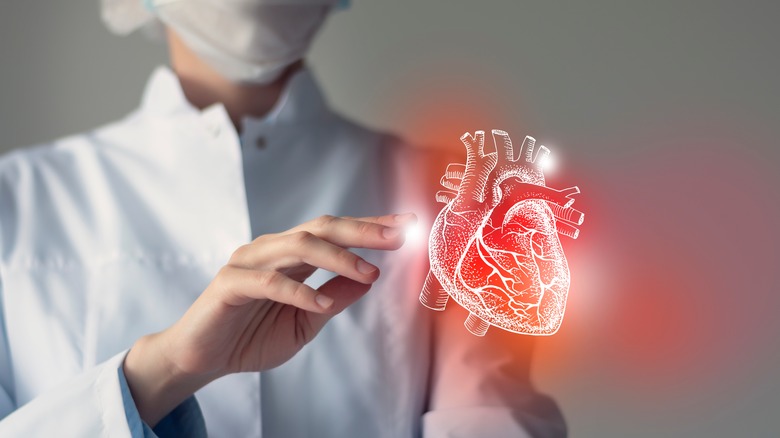How Is HCM Diagnosed?
There's no denying that heart disease is a common ailment worldwide. According to the Centers for Disease Control and Prevention, in 2020, around 697,000 Americans died from heart disease. Although some medical conditions like high blood pressure and high blood cholesterol can increase your risk of heart disease, some factors are down to genetics. According to a 2022 study published in the journal Frontiers in Cardiovascular Medicine, hypertrophic cardiomyopathy (HCM) is the most common genetic heart disease in the United States, with a prevalence of 1 in 500. The disease thickens the heart muscle and enlarges it beyond its normal size (via Johns Hopkins Medicine).
According to a 2013 study published in the Canadian Medical Association Journal (CMAJ), hypertrophic cardiomyopathy came to public recognition due to a rise in sudden deaths in young, healthy people. The condition is triggered by genetics, meaning you can inherit it from your parents, but it's not yet clear exactly how it's inherited, according to Johns Hopkins Medicine. However, efforts are underway to understand other factors that trigger the condition. Here is how hypertrophic cardiomyopathy is diagnosed and treated, as well as the symptoms associated with the condition.
How is hypertrophic cardiomyopathy diagnosed?
Most cases of hypertrophic cardiomyopathy go undiagnosed because the condition seldomly presents symptoms, despite being potentially fatal (via Mayo Clinic). During a diagnosis, your doctor may assess your medical history or ask you to undergo a physical examination to determine if you have hypertrophic cardiomyopathy, as explained by WebMD. An echocardiogram is also part of the diagnosis. This ultrasound test can also help reveal critical information or the status of your heart, per the Cleveland Clinic. Your doctor may recommend a chest X-ray, exercise stress test, and a CT or MRI scan for a more effective diagnosis, per WebMD. If the left ventricular wall thickness is beyond 15 millimeters, your doctor might confirm hypertrophic cardiomyopathy, per the American College of Cardiology.
There's no known cure for hypertrophic cardiomyopathy, but according to the British Heart Foundation, medications can help control abnormal heart rhythms and reduce the amount of work your heart does. These medications include beta-blockers, antiarrhythmics, and calcium channel blockers, says the American Heart Association. Some surgical procedures like may also be needed. A septal myectomy, for example, is an open-heart surgery where a surgeon removes the septum pushing into the left ventricle to restore blood flow, per the American Heart Association.
People with hypertrophic cardiomyopathy can also benefit from healthy lifestyle changes if they don't experience any of the condition's symptoms, says the American Heart Association.
Symptoms of hypertrophic cardiomyopathy
As mentioned, hypertrophic cardiomyopathy is characterized by heart muscle thickening. The thickened septum may cause a narrowing, limiting blood flow from the left ventricle to the aorta (via Cleveland Clinic). This may cause some people to experience various warning signs of heart problems. This includes chest pains, shortness of breath, and dizziness, especially after engaging in physical activity (via Healthline). Some people also become tired and experience fluttering heartbeats and heart palpitations, which may occur at any time.
Even though people register no symptoms, the condition's first clinical presentation is sudden death from arrhythmias, according to a 2022 study published in the journal StatPearls. Some people may also develop other complications like heart block or endocarditis — the latter being rare, per the Hypertrophic Cardiomyopathy Association.
Seeking early diagnosis is vital if you suspect you have this condition or a family member has it. According to Stanford Medicine, some people with this condition can live full lives without life-threatening complications if they receive the right care.



